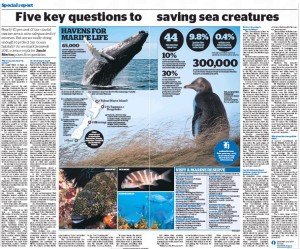As part of a series on Seaweek 2015, New Zealand Herald science reporter Jamie Morten looks at the big questions in marine conservation.
 An excerpt (read in full here):
An excerpt (read in full here):
Five key questions to saving sea creatures
Nearly 10 per cent of our coastal marine area is now safeguarded by reserves. But are we really doing enough to protect our ocean habitats? As we mark Seaweek 2015, science reporter Jamie Morton poses five key questions.
Why do marine reserves matter?
We might think of them as sanctuaries for our cherished ocean species and habitats, but their benefits stretch well beyond conservation.
As a study by marine biologist Dr Bill Ballantine put it, they are as important to science as clean apparatus is to chemistry.
Marine reserves, he said, were the “controls for the uncontrolled experiment that is happening due to fishing and other human activities”.
While ocean ecosystems could act as sentinels of large-scale changes in our environment, protecting them also had valuable spin-offs away from the water in education, recreation and management, tourism and coastal planning.
The Department of Conservation states marine reserves can be established in areas that contain underwater scenery, natural features, or marine life of such distinctive quality, or “so typical, beautiful or unique” that their continued preservation is in the national interest.